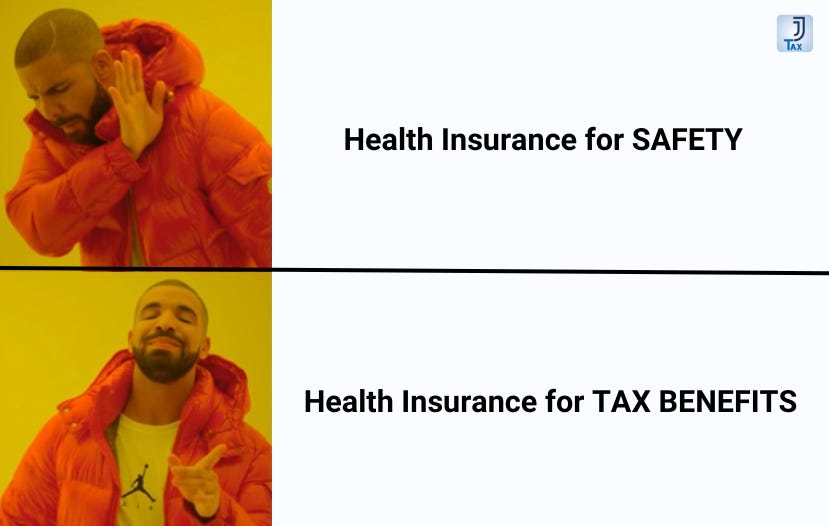💡A must-have guide

Even if I might say to myself, 'I don't need health insurance as I won't fall sick,' the fact is, as mortals, we are going to get sick and it's unpredictable. Without a health insurance, getting sick or injured could mean bankruptcy, not getting proper care, or even death in extreme cases.
Despite these risks, a large portion of the Indian population is still not covered under health insurance. Recognizing this, the Indian government has incentivized health insurance through tax benefits under Section 80D of the Income Tax Act. This article explores how you can leverage these tax deductions to secure your health and financial well-being.
What is Section 80D
According to Income Tax Act, 1961, every individual and HUF (Hindu Undivided Family) can claim a deduction on the amount spent on maintaining a health insurance policy.
The deduction is also given for medical expenditure incurred on the health of senior citizen (aged 60 years or above) who is not covered under any health insurance scheme.
In simple terms, Section 80D encourages you to get health insurance by offering a tax incentive, making it a smart way to protect your health and save on taxes at the same time.
Who can claim deductions under Section 80 D?
Individual and HUF taxpayers can avail deduction u/s 80D for insurance covering self, spouse, parents, and dependent children.
Any other entity such as a company or firm cannot claim deduction under this section.
But one should always keep in mind that deduction for medical expenses and insurance premiums for senior citizens is allowed to individuals and HUFs.
What is the Deduction limit?
Threshold Limit depends upon the age of the person and his/her parents.
For a person who is aged below 60 years, the limit is INR 25,000 (including INR 5,000 on preventive health check-ups).
But if the age of the insured is above 60 years, the limit increases to INR 50,000.
Apart from the above, an additional deduction of INR 25,000 is available for parents. If parents are aged above 60, the deduction amounts to INR 50,000.
Apart from the above, medical expenditure of up to Rs. 50,000 incurred on the health of senior citizen parents (aged 60 years or above) who are not covered under any health insurance scheme is allowed.
What are excluded under Section 80D?
Section 80D has certain exclusions which cannot be availed as a tax deduction -
A health insurance premium paid for siblings, grandparents, and employed children.
A health insurance premium paid in cash are not considered.
Premium on group health insurance made by the company on behalf of employees.
You cannot receive any tax benefit on cess and GST charges on your health insurance premium.
Conclusion
Investing in health insurance is a smart move for both your health and your wallet. Here are the key takeaways:
Tax Savings: Section 80D allows you to claim deductions on health insurance premiums for yourself, spouse, children, and parents.
Higher Benefits for Seniors: Greater deductions are available for insuring senior citizens aged 60 and above.
Medical Expenses: Deductions are also available for medical expenses of senior citizens not covered by insurance.
Exclusions: Premiums paid in cash and for extended family members like siblings and grandparents don't qualify.
Take advantage of these benefits today to secure your health and financial well-being.
By understanding and utilizing these tax benefits, you can ensure financial stability during medical emergencies.
What’s new under Section 80D
You can avail of tax benefits up to INR 5000 on preventive health check-ups even if paid in Cash.
All basic health insurance policies qualify for benefits under section 80D.
Premium paid towards critical illness add-on covers are eligible for tax exemption.
Senior citizen includes senior and very senior citizen above 60 years of age.
Don’t miss out on these and other advantages - click here to calculate your tax liability and see how much tax you can save with the right set of deductions.
Also check our explaining how you can save tax on income upto 10 Lakhs.
Still have more questions, contact us for personalized assistance from a tax expert for your tax planning and related queries.

